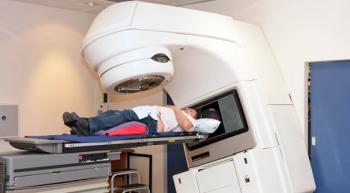Articles by Kristie L. Kahl

Like most other adverse events (AEs), nurses play a vital role in monitoring for and managing endocrine toxicities associated with immunotherapy treatment; however, these may be more unique than others, according to Marianne Davies, DNP, RN, CNS, ACNP-BC, AOCNP.

Nurses should know what to look for when it comes to managing dermatologic toxicities.

There are multiple steps nurses must take to prevent and manage pulmonary toxicities in patients taking immunotherapy.

The Centers for Medicare and Medicaid Services (CMS) announced that it will cover chimeric antigen receptor (CAR) T-cell therapy for Medicare beneficiaries.

To start, nurses must be able to prevent and anticipate GI toxicities.

Patients experiencing chemotherapy-induced nausea and vomiting (CINV) need to understand what can be done to help their symptoms, and oncology nurses can educate them on what is best to take for CINV.

There are key steps that nurses can follow to improve upon patient expectations and their understanding of end-of-life care.

Nurses must understand CAR T-cell therapy and be able to recognize what to do when encountering patients who have received it.

Nurses can serve in a variety of roles when it comes to clinical trials – from being a research nurse or a vital piece of the multidisciplinary team, according to Maria Hendricks, MSN, RN.

While the treatment landscape for lung cancer continues to grow, nurses must stay up-to-date on the most recent advances and approvals across each subgroup of patients.

To assist in treating patients with immune-related adverse events (irAEs), nurses can follow 5 pillars: prevent, anticipate, detect, treat, and monitor.

Understanding CLL is important for all oncology nurses, regardless if they specialize in hematologic or solid malignancies.

Nurses play a key role in addressing the barriers associated with patients with cancer entering a clinical trial, according to Maria Hendricks, MSN, RN.

With various FDA approvals in the last year alone, nurses must stay up-to-date on the changing treatment landscape of breast cancer to properly treat these patients.

A pediatric oncology nurse’s experience came full circle following her own bladder cancer diagnosis, followed by serving as a caregiver to her husband who faced the same disease 6 years later.

With a goal of championing the value of patient navigators, Susan G. Komen Greater New York City and NYU Langone have teamed up to provide patients with improved care in Brooklyn through a new patient navigation project.

The treatment landscape for mantle cell lymphoma (MCL) is rapidly evolving, though patients with relapsed/refractory disease tend to still have poorer outcomes than others; however, hope may be on the horizon, according to Luhua (Michael) Wang, MD.

Implementation of a referral tool designed to enhance family history screening during doctor’s visits may play a crucial role in identifying those at risk for cancer.

The FDA granted a fast track designation to momelotinib for the treatment of patients with intermediate/high-risk myelofibrosis who have previously received a JAK inhibitor.

Venetoclax (Venclexta) to obinutuzumab (Gazyva) reduced the risk for disease worsening or death

Maintenance therapy with olaparib (Lynparza) significantly improved progression-free survival (PFS) compared with placebo among patients with germline BRCA-mutated metastatic pancreatic cancer, according to results from the phase III POLO trial presented at the 2019 ASCO Annual Meeting.

The FDA granted a priority review to daratumumab (Darzalex) in combination with bortezomib (Velcade), thalidomide and dexamethasone (Vtd) for the front-line treatment of newly diagnosed patients with multiple myeloma who are candidates for autologous stem cell transplant.

Two new urine tests currently being investigated for bladder cancer detection and monitoring have demonstrated more than 90% sensitivity and specificity – highlighting the potential for addressing an unmet need among this patient population.

Lenalidomide (Revlimid) significantly reduced the risk for smoldering multiple myeloma to progress to cancer among patients with moderate to high risk, according to findings from the phase II/III E3A06 trial to be presented at the 2019 ASCO Annual Meeting.

The FDA approved the combination use of avelumab plus axitinib for the first-line treatment of patients with advanced renal cell carcinoma.

Children with severe sensorineural hearing loss (SNHL) from brain tumor treatment demonstrated greater reading difficulties compared with those who experienced mild or no hearing loss.

Healthcare providers of all disciplines should work together to educate individuals about the symptoms of colorectal cancer.

In the middle of the night in June 2015, David Yoskowitz’s experience woke him with a groundbreaking idea: a cold mouthpiece that would combat chemotherapy-associated mouth sores.

Nurses play a key role in the multidisciplinary approach that is needed to care for patients with neuroendocrine tumors (NETs).

Nurses play a key role in helping to manage the chronic adverse events (AEs) associated with radiation, even into survivorship, according to Hilda Haynes-Lewis, PhD, ANP-BC, AOCNP.




























